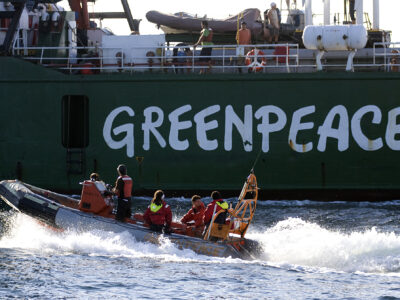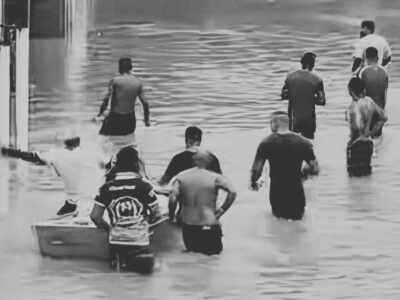
Photo via Giovana Fleck
Over the last decade, natural disasters have become increasingly severe, frequent, and dangerous and have impacted more and more people around the world. Wildfires have ravaged nations and terrorized towns; coastal ecosystems have been damaged — some beyond repair, impacting our fishing industries, tourism, and other wildlife; and island nations and coastal communities have seen their land wash away and disappear as if it was never there. But even as more people take notice of the changes wrought by the climate crisis, our governments’ responses have been lackluster and our media landscape has failed to reflect the reality on the ground.
These changes have already been affecting low-income, coastal, and Indigenous communities for decades, even as community leaders have called for decisive international climate action — calls that have too often gone unheeded. While it is understandably easy to turn to despair amid this crisis, those who are most affected by these changes do not have that luxury, and are instead seeking out innovative, community-based climate solutions. Global Voices hopes to promote these stories of resilience by reporting on environmental stories through an intersectional lens that prioritizes local knowledge and experiences.
To that end, our community has established the Green Voices initiative — a collective of environmentally focused journalists, translators, and stakeholders who seek to use our global perspective to raise awareness about environmental issues and those affected by them. Green Voices meets virtually twice a month to discuss environmental news in our communities, identify underrepresented voices, plan our coverage of these topics, and offer support in a field that can often feel overwhelming. In a true Global Voices spirit, we believe that insightful journalism is made possible by community, companionship, and collaboration.
Each month, approximately 15–20 percent of Global Voices’ articles address environmental challenges or advocacy efforts around the world. We are committed to sharing underreported stories about the climate crisis and environmental exploitation, with a particular focus on rural communities and local initiatives guided by women and Indigenous groups aimed at preserving, bolstering, or rehabilitating the environment. We leverage Global Voices’ international community to report on issues that are often reduced to abstract data with nuance, humanity, and a local perspective.
Some stories that have grown out of Green Club collaborations include “How a swimming pool became Puerto Rico's symbol of climate change and corruption,” “Kanal Istanbul, Turkey's Middle Corridor, and the Belt and Road Initiative,” and “How Assamese Villages use traditional wisdom to guide climate preparedness.” Our stories explore these issues from an intersectional perspective, revealing how environmental issues can impact women, youth, people with disabilities, and vulnerable populations, and can exacerbate existing inequalities.
If you would like to participate in Green Voices or join the discussion, email our green club coordinator Sydney Allen!
See some of our recent environmental stories below.
Stories about Green Voices
In Nepal, families that farm together stay together
The UN designated 2019–2028 as the "Decade of Family Farming". Some Nepali households are embracing sustainable agriculture to address climate change and enhance income.
Rising public frustration in Thailand over Chiang Mai’s air pollution crisis
"Basic precautions such as warnings, distribution of protective equipment to the public, and efficient operations against forest fires have not been adequately implemented."
Balancing Indigenous rights and nature conservation in Nepal
The publication of Nepal's policy on “Construction of Physical Infrastructure Inside Protected Areas” has ignited a lot of controversy for its potential to displace Indigenous communities from their ancestral lands.
Solving the invasive aquatic weeds problem in Nepal
Water hyacinth, an invasive Amazonian species, clogs Nepal's waterways, suffocating native flora and blocking essential nutrients for aquatic life. A Nepali handicraft collective creatively repurposes its fibre for household items.
Remembering the victims of nuclear weapons testing in the Marshall Islands
"Why was the most beautiful corner of the world, with the most beautiful and peaceful people, chosen for these horrific acts without our informed consent?"
Greenpeace opens office in Sri Lanka amid ongoing climate crisis
Global Voices' partner Groundviews spoke to Executive Director of Greenpeace South Asia, Binu Jacob, about the climate challenges facing the region and the role of Greenpeace in combatting climate injustice.
Climate crisis ruins Himalayan pastoralists
Winter droughts and delayed snowfall are impeding grass regrowth in high-altitude grazing sites in Nepal's Eastern Rukum district, endangering the local sheep population and forcing shepherds to leave profession.
Amidst floods in Brazil, government minister turns environmental racism into a national debate
Floods and heavy rains in the state of Rio de Janeiro caused 12 deaths and devastation in January. After Racial Equality Minister Anielle Franco pointed out environmental racism, the term sparked a national debate.
In search of Australia's treasured koala
With Australia facing potentially catastrophic bushfires this summer like the 2019–2020 season, one of its favorite animals, the koala, is under threat on a number of other fronts as well.
Australia's bid to co-host COP31 climate conference faces obstacles
Since the election of the new Labor government in 2022, Australia’s international reputation regarding climate action has risen considerably as result of stronger emissions targets and its enhanced safeguard mechanisms.
Australia-Tuvalu Falepili Union: Climate justice or defense treaty?
"Offering residence or citizenship rights to Tuvaluans, though a compassionate response, does not halt the inexorable rise in sea levels."
Project Khale Hobe: How the power of one aided by social media can better lives
A group of young volunteers led by a cartoonist, came forward to clean a polluted canal coursing through a populated area of Dhaka, earning praise from the entire nation.
Australia's elusive platypus faces many threats to its survival in the wild
In general, experts are on the same page that platypuses are struggling and will continue to decline if nothing changes.
How climate change is affecting farmers in Tobago
Decreasing yields are a result of increasingly tough growing conditions, with extremely dry weather in some growing seasons, and over-saturated soils in others, when there is extreme rainfall.
Ecuador's historic referendum reignites Latin America's debate on extractivism and economic growth
Almost all Latin American countries are still tempted to use extractivism as a development model. Is it possible to strike a balance between environmental conservation and economic growth?
Microplastic pollution in Sri Lanka: A silent killer in the making
Microplastics are toxic to all living beings. Until we can replace plastics or combat microplastics, the general rule must be to avoid any indiscriminate usage of plastics in our lives.
Australian cartoonists boycott media awards over fossil fuel censorship
"It's 2023, and it's simply unconscionable that the highest awards in Australian journalism are sponsored by fossil fuels, with no specific climate reporting award."
The mission to save Nepal’s sarus cranes
The Sarus crane’s cultural importance has made it popular in Nepal and beyond. But rapid urban spread has resulted in the decimation of its habitat.
China retaliates as Japan discharges treated radioactive water from Fukushima
China is the only country in the world that bans seafood from Japan over Fukushima discharge of treated radioactive wastewater.
‘Stop the dump’: Pacific communities protest Japan’s release of treated nuclear water
"If it is safe, dump it in Tokyo! If it is safe, test it in Paris! If it is safe, store it in Washington! But keep our Pacific nuclear free!"
Villages near Russia's former Gulag capital Vorkuta are facing extreme river pollution
Journalists share how people in the remote villages of Komi, Russia, live after a major wastewater treatment plant accident. Officials and residents don't seem worried.






















